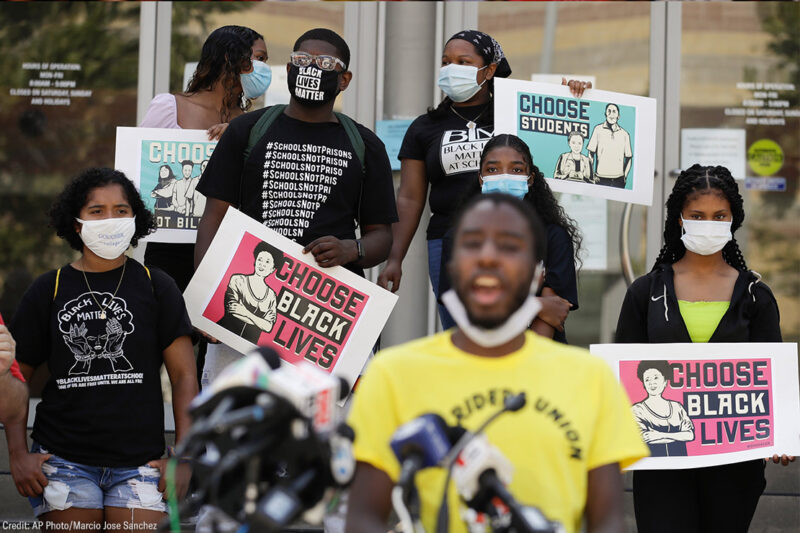The Biden Administration Must Prioritize Reversing Trump's Damage to Racial Justice Policy


In the last four years, the Trump administration has aggressively dismantled federal protections that ensure equal treatment against racial discrimination, amplified racist rhetoric, and explicitly targeted communities of color with harmful executive actions. The Biden-Harris administration must both reinstate federal rules that protect against racial discrimination, and take meanginful steps to further advance racial justice in the U.S.
Here are just a few of the many items that should top the Biden Administration’s to-do list:
Support H.R. 40
The Biden-Harris administration must support H.R. 40, a bill that would set up a long overdue commission to examine the institution of slavery, its legacy, and make recommendations for reparations to Congress.
During slavery, Black people were forced to labor for the enrichment of America. After slavery, the emancipated suffered violent repression and exploitation under Jim Crow laws and Black codes in the South and de facto segregation across the nation. Since then, the vile policies of enslavement, codified in American culture and the Constitution, shifted to take on new forms of injustice and drivers of oppression that are still woven across our institutions today — from education and healthcare to our criminal legal system. The U.S. government has continued to perpetuate and often profit from racially-exclusionary policies and practices that disadvantage Black people in all aspects of society. This is evident in modern day voter suppression, policies that deny Black people fair housing opportunities, redlining practices that perpetuate segregation, legislation such as the Homestead Act, which actively denied economic justice opportunities to Black people, and mass incarceration.
H.R. 40 is a critical first step toward addressing the fundamental injustice, cruelty, brutality, and inhumanity of the institution of slavery in the United States and its legacy. Reparations for slavery are necessary if we are to advance racial justice in this country. The Biden administration must support H.R. 40.
End attacks on racial and gender equity trainings
The Biden-Harris administration must rescind President Trump’s executive order banning federal entities and contractors from providing employees with training on “divisive concepts” and “harmful ideologies” related to race and gender.
What Trump deems “harmful ideologies” are actually concepts diversity trainings use to educate individuals on the systemic barriers and discrimination people of color and other marginalized groups in this country still face today across our institutions — from our workplaces and schools to our criminal legal system. Our country needs to acknowledge its history of systemic racism and sexism and reckon with present day impacts of racial and gender discrimination. Halting all diversity training could set back progress in addressing these systemic issues, among others — including in the workplace. In order for us to move forward as a country to address racism and sexism, the Biden administration must do its part and rescind this “On Combating Race and Sex Stereotyping.”
Address disparities in school discipline
With the rise of law enforcement in schools, the proliferation of zero-tolerance policies, and misuse of suspensions and expulsions, our nation’s school discipline policies are pushing children out of school into the school to prison pipeline. Black and Brown students, students with disabilities, and other marginalized students are disparately impacted by these punitive approaches to school discipline.
As part of a reinstatement of civil rights guidance, the Biden administration should reinstate federal guidance on nondiscriminatory school discipline and support school districts in pursuing alternatives to exclusionary and punitive school discipline practices that disproportionately harm students of color and students with disabilities.
Protect diversity in our schools
The Biden administration must reinstate guidance on voluntary use of race in school admissions to achieve diversity and avoid racial isolation in elementary, secondary schools, and in postsecondary education, as outlined in .
The to promote racial diversity and end the growing racial isolation in K-12 classrooms and in higher education provided a thoughtful and clear explanation of two Supreme Court cases governing the use of race in K-12 education and higher education, Parents Involved v. Seattle Schools and Grutter v. Bollinger, which recognized the importance of promoting diversity in learning environments and established parameters for doing so. The guidance documents acknowledged a problem that education experts as well as students and parents long recognized: Too many of our nation’s classrooms are racially isolated, and this isolation is only increasing among students.
The guidance also outlined the Supreme Court’s explicit recognition that promoting diversity and avoiding racial isolation in schools are not only compelling governmental interests but also among the nation’s highest priorities. The guidance demonstrated the various ways that efforts to create diverse student bodies in schools and universities can be done effectively, fairly, and in compliance with the existing law in order to improve the quality of education for all students.
The administration should also reinstate guidance on access to education for all children, regardless of immigration status. The Trump administration withdrew the federal guidance that provided school districts with important clarity on the requirement under federal law to provide equal access to education for all children, regardless of immigration status. The Supreme Court in Plyler v. Doe recognized that denying children a basic education is to “deny them the ability to live within the structure of our civic institutions” and to contribute to society. The guidance provided critical recognition of the rights of children and gave educators the practical information necessary to comply with federal law and support their students. The administration must reinstate this guidance to give all children the equal opportunity to access education — regardless of their immigration status.

